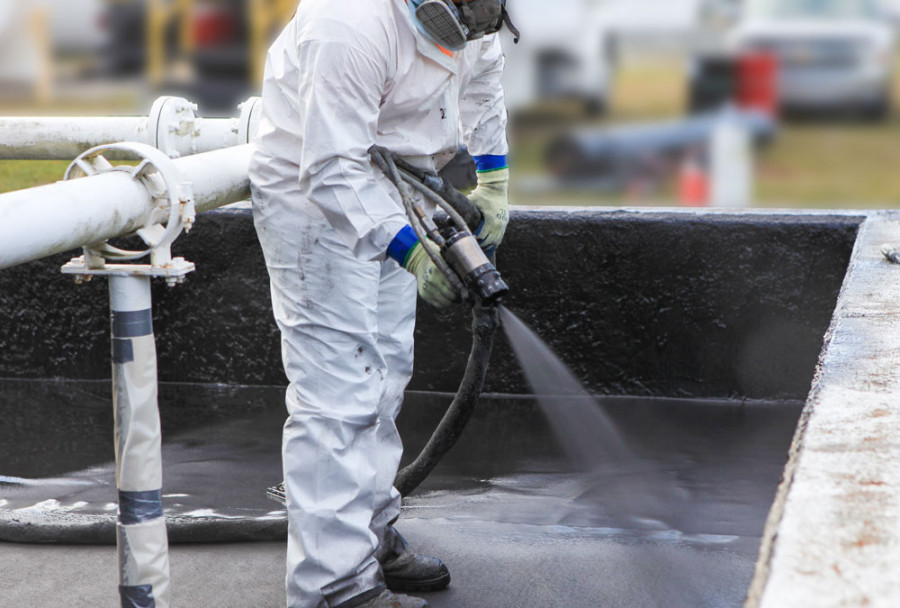Polyurea coatings offer a range of advantages that make them a popular choice for protective coatings in various industries. From their durability and flexibility to their chemical resistance and waterproofing capabilities, polyurea coatings have proven to be a reliable solution for a wide range of applications. In this article, we will explore the key aspects and benefits of polyurea coatings, as well as their market outlook and common applications.
What is Polyurea?
Polyurea is an elastomer substance derived from step-growth polymerization, which involves combining synthetic resin and isocyanate-reactive materials. This reaction produces polyurea, a versatile coating that can be customized to meet specific requirements. Different formulations of resins and isocyanates can provide desired features such as setting time, moisture resistance, pigmentation, and flame retardancy. Hybrid coatings, which blend polyurea with polyurethane, offer certain physical properties of pure polyurea at a lower cost.
Aliphatic Polyurea vs. Aromatic Polyurea
Polyureas derived from aromatic diisocyanates are sensitive to ultraviolet (UV) light and can undergo color changes and chalking when exposed to sunlight. While aromatic polyurea is a cost-effective option for base coat applications, it may not be suitable as a top coat. On the other hand, polyureas derived from aliphatic diisocyanates are resistant to color change and maintain their physical properties even under UV exposure conditions. Aliphatic polyureas are preferred for outdoor applications due to their aesthetic appeal, glossy appearance, and ability to be used at lower film thicknesses. However, they are relatively more expensive due to the complex processing involved.
Unique Features of Polyurea
Polyurea coatings offer several unique features that set them apart from other coating systems. These coatings provide excellent abrasion and scratch resistance, making them ideal for protecting surfaces from wear and tear. They also demonstrate stable resistance to weather and environmental conditions, making them suitable for both indoor and outdoor applications. Polyurea coatings have beneficial elongation characteristics, allowing them to withstand movement and prevent cracking. They can be applied in variable temperature conditions, even in high humidity, and offer stable heat resistance. Additionally, polyurea coatings exhibit excellent chemical resistance, making them suitable for a wide range of industrial environments.
Polyurea Market Outlook
The global market size for polyurea coatings has been steadily growing, driven by factors such as increasing demand for eco-friendly coatings and the need to protect infrastructure investments. Polyurea coatings are expected to reach a market size of USD $1.48 billion by 2025, with a compound annual growth rate (CAGR) of 10.8% between 2020 and 2025. Hybrid polyurea products are expected to contribute significantly to the market size, offering cost-effective options with good abrasion resistance and adhesion properties.
Polyurea vs. Epoxy and Polyurethane
Polyurea coatings outperform traditional coating materials such as epoxy and polyurethane in several key areas. Compared to epoxy coatings, polyurea offers superior moisture resistance, UV resistance (for aliphatic coatings), abrasion resistance, chemical resistance, temperature resistance, and durability. When compared to polyurethane, polyurea coatings exhibit greater durability, chemical resistance, and moisture resistance.
Common Applications of Polyurea Coatings
Polyurea coatings find numerous applications across various industries. Some of the most common applications include:
Concrete Coatings
Polyurea coatings provide a moisture barrier and protective film for concrete surfaces, protecting them from deterioration and water damage. These coatings can be sprayed into any configuration, creating a seamless and waterproof surface.
Food Processing & Cold Storage
Polyurea coatings are ideal for food processing and cold storage facilities as they create a monolithic barrier to moisture, bacteria, and debris. The smooth and durable surface of polyurea coatings makes cleaning and maintenance easy, ensuring a hygienic environment.
Mining & Excavation
Polyurea coatings offer excellent abrasion resistance, making them suitable for protecting mining equipment from wear and tear. These coatings can withstand the harsh working conditions in mining and excavation operations.
Water & Wastewater Treatment Plants
Polyurea coatings are used to protect plumbing, sewer, and wastewater systems from corrosion. These coatings provide a durable and chemically resistant barrier, ensuring the longevity and integrity of these structures.
Energy, Oil, and Petroleum
Polyurea coatings are widely used in the energy industry to protect against leaks and spills. They offer primary and secondary containment for oil and petroleum storage tanks, providing chemical resistance and preventing environmental damage.
Defense and Security Sectors
Polyurea coatings are utilized in the defense and security sectors due to their impact resistance, durability, and quick-setting features. They are used in ballistic missile systems, military equipment coatings, and for protecting military buildings.
Healthcare
Polyurea coatings are employed in healthcare facilities to maintain sterile conditions and prevent the spread of bacteria. These coatings seal cracks and prevent moisture seepage, minimizing the risk of bacterial propagation.
Surfaces of Steel and Concrete Bridges
Polyurea coatings are used for the initial coating and maintenance of steel and concrete bridges. They offer fast curing, impact resistance, and high durability, helping to prevent the collapse of concrete structures.
Application Methods for Polyurea Coatings
Polyurea coatings can be applied using various methods, depending on the scale and nature of the project. The most common application methods are:
High Pressure Hot Spray
This method involves surface preparation, mixing the components, and applying the coating using a high-pressure spray system. It is suitable for large-scale coating jobs and requires specialized equipment.
Warm Spray Coating
This method is used for medium-volume spray coating jobs and involves applying the coating at a lower temperature.
Low Pressure Cold Spray
For small surface area jobs and repairs, a low-pressure cold spray method can be used. This method is convenient when spraying is not feasible, such as with small pipe interior coatings.
Roller or Brush On Methods
In certain cases where spraying is not possible, polyurea coatings can be applied using rollers or brushes.

